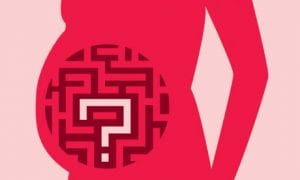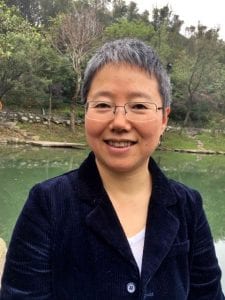Reflections on Abortion in China
By CCHH bloggers, on 2 March 2017
Author: Huang Qin 黄沁
 On Thursday 9 February, a thought-provoking lecture about abortion in China was delivered at UCL by Cong Yali 丛亚丽, a professor at Peking University and one of China’s leading bioethicists. Prof. Cong introduced her research on abortion in China and explained the reasons why Chinese people seem to exhibit indifference to the performance of abortion. She stated that in traditional Chinese culture, the foetus, rather than being regarded as a human, was frequently considered as an instrument for the continuation of a clan. In addition she said, in contemporary China, no law existed to protect the foetus’s right to life, and abortion was not a crime. Thus performing an abortion was more of a family decision than a public ethical issue or a legal issue in China.
On Thursday 9 February, a thought-provoking lecture about abortion in China was delivered at UCL by Cong Yali 丛亚丽, a professor at Peking University and one of China’s leading bioethicists. Prof. Cong introduced her research on abortion in China and explained the reasons why Chinese people seem to exhibit indifference to the performance of abortion. She stated that in traditional Chinese culture, the foetus, rather than being regarded as a human, was frequently considered as an instrument for the continuation of a clan. In addition she said, in contemporary China, no law existed to protect the foetus’s right to life, and abortion was not a crime. Thus performing an abortion was more of a family decision than a public ethical issue or a legal issue in China.
Despite the widespread apathy among the Chinese public towards the performance of abortion, Chinese scholars like Cong have paid increasing attention to issues surrounding abortion in China since the 1980s. The number of publications on abortion which contain keywords such as ‘right to life’, and ‘reproductive rights’ has increased dramatically since 2000. Moreover, studies on abortion in China are carried out not only in the field of medical science but also in demography, law, politics, etc.[1] These statistics indicate that abortion in China tends to be an interdisciplinary research topic and is bound to resonate with legal, historical as well as ethical issues.
Abortion in China, from a historical perspective, has moved from being a private matter to a national plan. In both the Ming dynasty and the Qing dynasty, having or performing an abortion was a personal affair, and the government did not intervene in this issue. However, as laws of European countries and Japan were introduced to China in the late Qing dynasty, the Qing government promulgated the New Criminal Law in 1911, which first treated the practice of abortion as a crime. Then in the Republican period, people who underwent or performed an abortion were punished according to the Criminal Law of the Republic of China. In 1935, heavy penalties were imposed on anyone who forced a pregnant woman to have an abortion according to the revised Criminal Law of the Republic of China. Some intellectuals such as Song Guobin 宋国宾 at that time also argued that the foetus had the right to life, while some traditional scholars believed that imposing punishments for abortion could help maintain the traditional ethical order and public morality. Some nationalists were also against abortion in view of the declining population. Due to these legislative measures and social concepts, physicians refused to perform abortions and women in need turned to unqualified abortionists.[2] Later, after the establishment of the People’s Republic of China, the one-child policy also affected Chinese people’s abortion behaviour. Thus, abortion issues have gradually entered the national discourse since the late Qing dynasty with the influence of the ideas from European countries and the notion of national renewal.
From the legal perspective, abortion is not regarded as a crime in contemporary China according to the Criminal Law of the People’s Republic of China. The general theories of Chinese criminal law provide that human life begins at birth and ends with death. On this point, a foetus is not regarded as a human being and does not have human rights. However, some Chinese jurists such as Zhou Xiang 周详 think that people commit intentional homicide when they force a pregnant woman to have an abortion or a pregnant woman decides to have an abortion because of gender selection while the foetus is physically able to survive outside the uterus. [3]
In bioethics, scholars like Quan Linchun 权麟春 have highlighted the power of the weak and the wholeness and completeness of humanhood, asserting that these basic bioethical principles indicate that the foetus should be regarded as human and have its own moral status and enjoy the right to life.[4]
Studies on abortion in China, which have been carried out in various disciplines, have shown the complexity of abortion issues. As abortion practices are always intertwined with legal, political, and ethical problems, cooperation between different academic institutions as well as various academic fields is significant in addressing problems in abortion behaviour. Therefore, Prof. Cong Yali’s lecture has not only deepened people’s understanding of abortion issues in China, but also will promote cooperation on bioethics between international academic institutions like UCL and PKU.
Bibliography
Long Wei 龙伟 2012, Duotai feifa: minguo shiqi de duotai zui ji qi sifa shijian 堕胎非法:民国时期的堕胎罪及其司法实践 (Unlawful Abortion: the Crime of Abortion in the Republican Period and Its Judicial Practice), (1), Modern Chinese History Studies, 92-104.
Quan Linchun 权麟春 2011, Duotai yu shengming zunyan zhi wo jian 堕胎与生命尊严之我见 (My View on Abortion and Dignity of Life), 32(12), Medicine and Philosophy, 21-23.
Zhou Xiang 周详 2012, Tai’er “shengming quan” de queren yu xingfa baohu 胎儿“生命权”的确认与刑法保护 (Foetus’s “Right to Life” and Its Protection in Criminal Law), (8), Law Science, 51-60.
[1] I used “duotai 堕胎” (abortion) as the key word to extract publication records for the period 1894 to present in the CNKI database.
[2] Long 2012, pp. 92-104.
[3] Zhou 2012, pp. 51-60.
[4] Quan 2011, pp. 21-23.
Huang Qin 黄沁 is a postgraduate student on the MA course in Chinese Health and Humanity (2016–17).
 Close
Close


